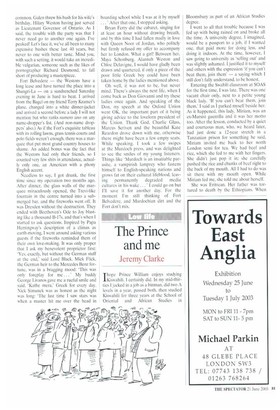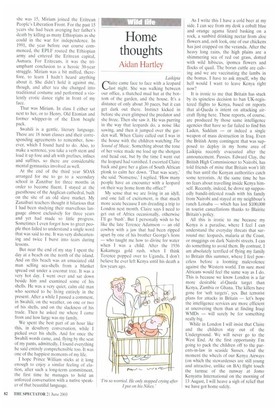The Prince and me
Jeremy Clarke
Ihope Prince William enjoys studying Kiswahili. I certainly did. In my mid-thirties I jacked in a job as a binman, did two A levels in a year, passed both, then studied Kiswahili for three years at the School of Oriental and African Studies in
Bloomsbury as part of an African Studies degree.
I went to all that trouble because I was fed up with being rained on and broke all the time. A university degree. I imagined, would be a passport to a job, if I wanted one, that paid more for doing less, and doing it indoors. At the time, however, I saw going to university as 'selling out' and was slightly ashamed. I justified it to myself and others with the expression if you can't beat them, join them' — a saying which I still don't fully understand, to be honest.
Entering the Swahili classroom at SOAS for the first time. I was late. There was one vacant chair only, next to a petite young black lady. 'If you can't beat them, join them,' I said as I parked myself beside her. As it happened, this lady, Miriam, was an ex-Marxist guerrilla and it was her motto too. After the lesson, conducted by a quiet and courteous man, who, we heard later, had just done a 12-year stretch in a Tanzanian prison for something he said, Miriam invited me back to her north London semi for tea. We had beef and rice, which she fed to me with her fingers. She didn't just pop it in; she carefully pushed the rice and chunks of beef right to the back of my mouth. All I had to do was sit there with my mouth open. While Miriam fed me, she told me about herself.
She was Eritrean. Her father was tortured to death by the Ethiopians. When she was 15, Miriam joined the Eritrean People's Liberation Front. For the past 15 years she had been avenging her father's death by killing as many Ethiopians as she could in the war for independence. In 1991, the year before our course commenced, the EPLF routed the Ethiopian army and entered the Eritrean capital, Asmara. For Eritreans, it was the triumphant conclusion to a heroic 30-year struggle. Miriam was a bit miffed, therefore, to learn I hadn't heard anything about it. She didn't hold it against me, though, and after tea she changed into traditional costume and performed a violently erotic dance right in front of toy face.
That was Miriam. In class I either sat next to her, or to Henry, Old Etonian and former whipper-in of the Eton beagle pack.
Swahili is a gentle, literary language. There are 18 noun classes and their corresponding agreements to remember, however, which I found hard to do. Also, to make a sentence, you take a verb stem and load it up fore and aft with prefixes, infixes and suffixes, so there are considerable mental gymnastics involved as well.
At the end of the third year SOAS arranged for me to go to a secondary school in Zanzibar for three months in order to become fluent. I stayed at the guesthouse of the Anglican cathedral, built on the site of an old slave market. My Zanzibari teachers thought it hilarious that I had been studying their marvellous language almost exclusively for three years and yet had made so little progress. Sometimes I even forgot how to greet people then failed to understand a single word that was said to me. It was very disheartening and twice I burst into tears during lessons.
But near the end of my stay I spent the day at a beach on the north of the island. And on this beach was an emaciated old man selling sea-shells from a blanket spread out under a coconut tree. It was a very hot day. I went over and sat down beside him and examined some of his shells. He was a very quiet, calm old man who seemed to be living entirely in the present. After a while I passed a comment, in Swahili, on the weather, on one or two of his shells, and on the slackness of his trade. Then he asked me where I came from and how large was my family.
We spent the best part of an hour like this, in desultory conversation, while I picked over his shells. And for once the Swahili words came, and, flying by the seat of my pants, admittedly. I found everything he said entirely comprehensible too. It was one of the happiest moments of my life.
I hope Prince William sticks at it long enough to enjoy a similar feeling of elation, after such a long-term commitment, the first time he manages to hold an unforced conversation with a native speaker of that beautiful language.



































































































 Previous page
Previous page